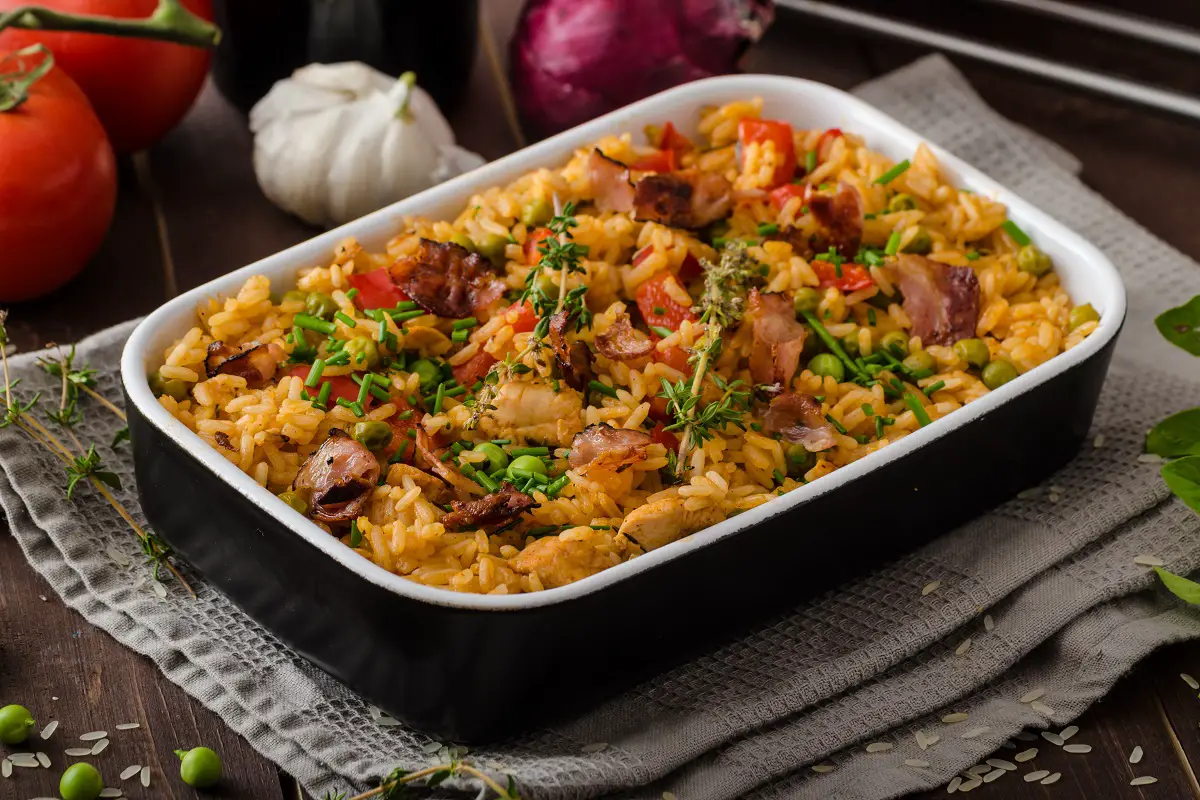Embark on a culinary journey with the universally beloved dish, Chicken and Yellow Rice Recipe. This comfort food transcends cultural boundaries, offering a taste of home across the globe. Its simplicity belies the depth of flavor and warmth it brings to the table, making it a staple in numerous households and celebrations.
Origins and Cultural Significance
Tracing the Roots: A Global Perspective
The historical journey of paella is a fascinating tale of evolution, originating in the Valencian region of Spain. Originally, it was a humble meal for farmers and laborers, made over open fires in the fields and composed of whatever ingredients were at hand. This often included snails, rabbits, and vegetables. Rice, introduced by the Moors during their rule over parts of Spain, became the staple ingredient, absorbing flavors and uniting the various components into a cohesive dish.
The Dish’s Place in Cultural Celebrations
Paella’s significance transcends its ingredients and preparation, embedding itself deeply in cultural traditions and celebrations. It is more than a meal; it is a symbol of community, unity, and identity. In Spain, paella is often at the center of family gatherings, festivals, and significant life events, embodying the spirit of togetherness. The act of sharing paella, from a single, large pan, reinforces bonds among family and friends, making it a dish that celebrates community and connection.
Key Ingredients
A Closer Look at the Main Components
We dive deep into the dish’s heart here, spotlighting the key ingredients. Each one, from spices to proteins, is crucial for the dish’s true flavor and aroma. These ingredients are vital for anyone trying to recreate the dish authentically.
Choosing the Right Type of Rice for Perfect Yellow Hue
Rice selection is key for the dish’s yellow color and unique texture. Basmati, Jasmine, or short-grain rice each affects the dish’s look and feel. This part guides on choosing rice that best suits the dish’s flavors and textures.
The Best Chicken Cuts for This Recipe
Flavor Enhancers
Spices and Herbs That Make a Difference
This section explores the essential spices and herbs, spotlighting how they define the dish’s character. We highlight the variety due to regional influences and compare fresh to dried herbs. This exploration is key for anyone aiming to capture the authentic essence of the dish.
The Role of Saffron: Color, Aroma, and Taste
Preparation Essentials
The Importance of Mise en Place
Stressing the significance of preparation before cooking, detailing how organizing ingredients enhances the cooking process and final dish.
To Soak or Not to Soak: Preparing Your Rice
Guidance on rice preparation, debating the merits of soaking versus rinsing, and how each method affects the dish.
The Cooking Process
Step-by-Step Guide to Cooking Chicken
Detailed instructions on marinating, searing, and cooking the chicken to perfection, ensuring flavor and juiciness.
Mastering the Art of Perfectly Cooked Yellow Rice
Techniques for cooking rice that is fluffy, aromatic, and beautifully colored, with tips on water ratios and timing.
Combining the Ingredients: Timing and Technique
A walkthrough of the critical steps to combine chicken and rice, ensuring flavors meld while maintaining texture.
Variations of the Recipe
Regional Twists on the Classic Dish
Exploring how different cultures adapt the recipe, incorporating local ingredients and cooking methods to create unique variations.
Vegetarian and Vegan Adaptations
Suggestions for substituting chicken and other non-vegetarian ingredients with plant-based alternatives, catering to diverse dietary preferences.
Cooking Tips and Tricks
Secrets to Achieving Fluffy, Non-Sticky Rice
This section offers expert advice on perfecting rice texture. We cover rinsing methods and optimal cooking temperatures. These tips are key for anyone seeking to master the art of cooking rice that’s both fluffy and non-sticky.
How to Ensure Your Chicken Is Juicy and Flavorful
The Essence of Chicken and Yellow Rice
From the aromatic allure of saffron to the tender, juicy bites of chicken, this dish is a symphony of flavors and textures. The vibrant yellow rice, achieved through the magic of spices, not only pleases the palate but also the eyes, making every serving a festive occasion.
Cultural Tapestry
The origins of Chicken and Yellow Rice span continents, with each region adding its unique twist. It’s a testament to the dish’s adaptability and appeal, embodying the spirit of communal dining and joy.
Crafting the Perfect Dish
Achieving the perfect Chicken and Yellow Rice involves a delicate balance of ingredients and techniques. The choice of rice and chicken cuts, combined with the mastery over spices like saffron, plays a pivotal role in bringing this dish to life.
Tips and Tricks for Perfection
From ensuring fluffy, non-sticky rice to cooking chicken to juicy perfection, several tips can elevate your cooking. Remember, the key lies in patience, the quality of ingredients, and the love poured into the cooking process.
Serving and Enjoyment
Chicken and Yellow Rice is best enjoyed with a selection of sides and the right beverage pairing. Whether it’s a simple green salad, a glass of crisp white wine, or a refreshing lemonade, each addition complements the dish, rounding out the meal.
Preserving the Delight
Leftovers, if any, can be stored and reheated without losing the essence of the dish. Proper storage and gentle reheating can revive the meal, ensuring that the dish remains a joy to consume even the next day.
Nutritional Balance
The classic Chicken and Yellow Rice dish is not only a feast for the senses but can also be a cornerstone of a nutritious diet. When prepared thoughtfully, it embodies a perfect symphony of flavors and health benefits. Opting for whole-grain rice, such as brown rice, in place of white rice, significantly elevates the dish’s fiber content, promoting better digestive health and providing a slower release of energy to keep you feeling fuller for longer. This simple substitution introduces B vitamins and essential minerals like magnesium and selenium, enhancing the nutritional profile of the meal without compromising its cherished taste.
Innovation in the Kitchen
Encouraging readers to experiment and adapt the recipe to their tastes and dietary needs ensures that Chicken and Yellow Rice remains a dynamic and evolving dish. Whether through regional variations or personal twists, the essence of the dish is its ability to bring joy and comfort.
Exploring Regional Variations: A World of Flavors
While Chicken and Yellow Rice is often associated with traditional recipes, exploring regional variations opens up a world of flavors. For example, in the Caribbean, the dish might be infused with tropical spices like allspice and thyme, offering a distinct island flair. In South American variations, the addition of cilantro and a squeeze of lime can bring a zesty twist that brightens the dish. Each region’s unique take on Chicken and Yellow Rice reflects local tastes and culinary traditions, demonstrating the dish’s remarkable versatility and global appeal.
Pairing Sides: Complementing Your Chicken and Yellow Rice
To truly elevate your Chicken and Yellow Rice experience, thoughtful side dishes can make a significant difference. Consider serving it with a crisp, tangy salad to cut through the richness of the rice and chicken. Roasted vegetables or a fresh tomato salsa can add texture and vibrant flavors, balancing the meal. Additionally, a side of steamed greens or sautéed spinach not only adds color but also boosts the dish’s nutritional value, making for a well-rounded and satisfying meal.
The Art of Garnishing: Enhancing Presentation and Flavor
Garnishing can transform Chicken and Yellow Rice from a comforting staple into a visually appealing and refined dish. Fresh herbs like parsley or cilantro can be sprinkled on top just before serving, adding a burst of color and a hint of freshness. Thinly sliced red onions or a few lemon wedges can also enhance the presentation, providing both visual appeal and extra layers of flavor. These small touches can elevate the dish, making it not only delicious but also a feast for the eyes.
Adapting the Recipe for Special Occasions
Chicken and Yellow Rice isn’t just a weeknight dinner; it can be adapted for special occasions and celebrations. For festive gatherings, consider preparing a larger batch in a beautiful serving dish, allowing guests to serve themselves family-style. Adding a touch of luxury with ingredients like saffron or high-quality chicken can make the dish feel more special. By incorporating seasonal vegetables or side dishes that complement the dish’s flavor profile, you can create a memorable meal that adds a touch of elegance to any event.
Conclusion
Chicken and Yellow Rice is more than just a meal; it’s a celebration of flavor, culture, and the simple joys of cooking and sharing food. As you embark on making this dish, embrace the process, experiment with flavors, and most importantly, share the warmth and love it represents with those around you.
https://ideasrecipes.net/index.php/2024/03/18/chicken-of-the-woods-recipe/
https://ideasrecipes.net/index.php/2024/03/18/ultimate-guide-to-the-drunken-noodle-menu-flavors-recipes-and-tips/
https://ideasrecipes.net/index.php/2024/03/18/the-ultimate-guide-to-chrissy-teigens-banana-bread/

